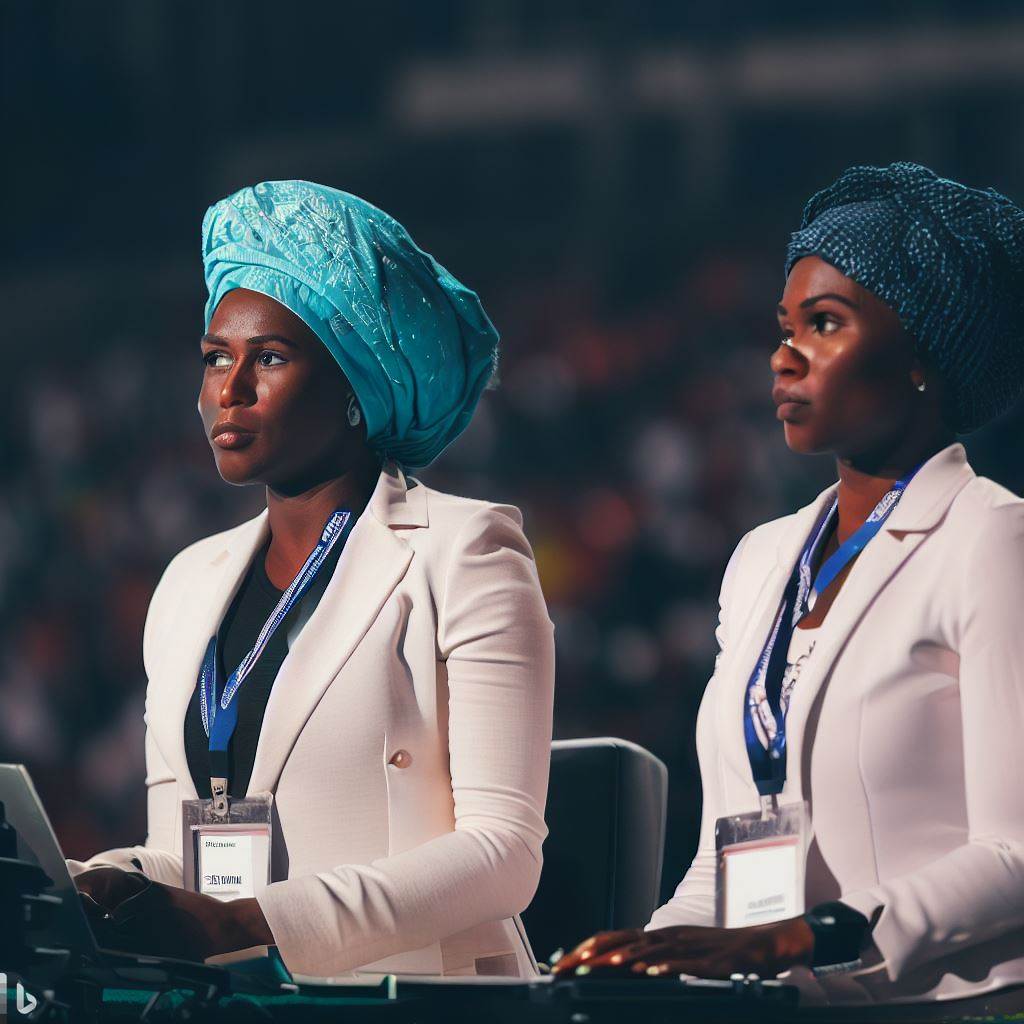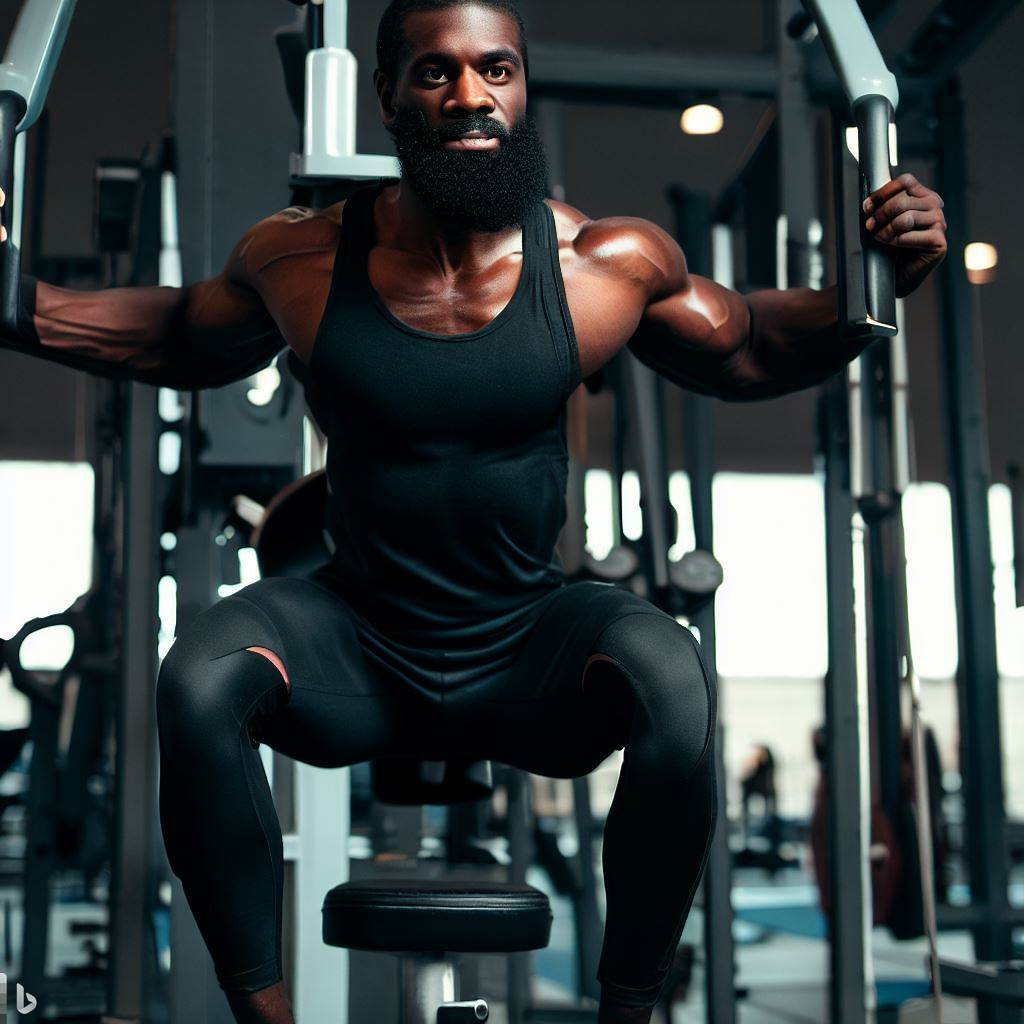Introduction
Sports Information Directors (SIDs) play pivotal roles in the sports industry, disseminating vital information to the public.
In Nigeria, women have been breaking barriers, actively participating and contributing to the growth of sports.
This section explores the growing significance of women as SIDs in Nigeria’s sports industry, highlighting their impactful presence.
Understanding Sports Information Directors (SIDs):
- Sports Information Directors (SIDs) are professionals responsible for managing and disseminating information related to sports.
- They handle media relations, statistics, and promotional activities to enhance the visibility of sports programs.
The Vital Role of Women in Nigerian Sports
- Women in Nigeria have been making significant strides in sports, both on and off the field.
- Their contributions extend beyond athletics, with growing involvement in sports administration, journalism, and management.
- Female athletes have excelled in various sports, becoming role models for the younger generation.
- Women’s sports leagues and competitions have gained popularity, increasing opportunities for female athletes.
Thesis Statement:
This blog chapter explores the rising prominence of women as Sports Information Directors in Nigeria’s sports industry.
It showcases their impact on sports information management, promoting gender diversity and driving positive change in the field.
Historical Background
History of sports information and its development in Nigeria
- Sports information in Nigeria has a rich history that dates back several decades.
- Initially, sports information was mainly disseminated through traditional media channels such as newspapers and radio.
- As sports evolved and became more popular, the need for dedicated sports information personnel arose.
- The first sports information directors (SIDs) in Nigeria were primarily men who took charge of providing updates and managing sports communication.
- These SIDs played a crucial role in promoting Nigerian sports and elevating their visibility both nationally and internationally.
- Over time, sports information departments were established in various sports organizations and institutions.
- This led to the professionalization of sports information and a recognition of its importance in the overall development of sports in Nigeria.
Exploration of the gender disparity in sports information roles
- Despite the progress made in sports information, there has been a significant gender disparity in the representation of women as SIDs.
- Historically, sports information roles have been dominated by men, thereby limiting opportunities for women to play a significant role in shaping sports narratives.
- The underrepresentation of women in sports information has perpetuated gender stereotypes and reinforced the notion that sports are primarily a male domain.
- This gender disparity can be attributed to various factors, including societal expectations, discriminatory practices, and limited access to educational and professional opportunities for women.
- The lack of female representation in sports information roles reflects a broader issue of gender inequality within the sports industry in Nigeria.
Discussion on the challenges faced by women in acquiring the position of SIDs
- Women face numerous challenges when it comes to acquiring the position of SIDs in Nigeria.
- The male-dominated nature of sports information departments often leads to biases and discrimination against women.
- Stereotypes and societal expectations contribute to the perception that women lack the necessary expertise and knowledge in sports.
- Limited networking opportunities and mentorship programs also hinder women’s advancement in the field of sports information.
- Access to specialized training programs and resources is often limited, further disadvantaging women who aspire to become SIDs.
- Balancing work and family responsibilities can be a significant challenge for women in sports information roles.
- The lack of gender-inclusive policies and initiatives within sports organizations and institutions also restricts women’s advancement.
- Despite these challenges, some women have successfully carved their path as SIDs and have become pioneers in the field.
The historical background of sports information in Nigeria highlights the significant gender disparity that exists in the representation of women as SIDs.
The underrepresentation of women in such roles reflects broader gender inequality issues within the sports industry.
Women face numerous challenges in acquiring the position of SIDs, including biases, stereotypes, limited networking opportunities, and lack of gender-inclusive policies.
However, with continued efforts towards promoting gender equality and creating a more inclusive environment, more women can break barriers and contribute to the field of sports information in Nigeria.
Read: International Opportunities for Athletic Trainers from Nigeria
Evolution of Women as Sports Information Directors
Success stories and influential women who paved the way
- Women in Nigeria have made significant strides as Sports Information Directors (SIDs).
- Notable success stories include the achievements of Funke Oshonaike in table tennis.
- Oshonaike has not only dominated the sport but also serves as a sports information director.
- Her success and dedication have inspired other women to pursue similar roles.
- Another influential woman in the field is Ngozi Okobi, a renowned football player and SID.
- These women have paved the way for more females to embrace sports information careers.
Initiatives and organizations supporting women in sports information
- Several initiatives and organizations are working to support and empower women in sports information.
- The Nigerian Association of Women in Sports (NAWIS) plays a crucial role in this regard.
- NAWIS provides mentorship programs, scholarships, and networking opportunities for aspiring women SIDs.
- Other organizations like Women in Sports Nigeria (WISN) also focus on promoting gender inclusion.
- These initiatives act as a support system, fostering growth and development for women in the field.
Roles and responsibilities of SIDs and their impact on promoting women’s sports
- As SIDs, women play a significant role in promoting women’s sports in Nigeria.
- They are responsible for managing and disseminating information about female athletes and teams.
- Through their work, they generate public interest and awareness in women’s sports.
- They collaborate with media outlets to ensure adequate coverage and exposure for female athletes.
- SIDs also organize events and tournaments that showcase women’s sports talent.
- By actively engaging in promoting women’s sports, SIDs contribute to breaking gender stereotypes and biases.
- Their efforts have led to increased participation, sponsorship, and overall growth of women’s sports in Nigeria.
The evolution of women as Sports Information Directors in Nigeria has seen significant progress.
Success stories of influential women like Funke Oshonaike and Ngozi Okobi have paved the way for aspiring women SIDs.
Initiatives and organizations such as NAWIS and WISN provide support and opportunities for women in the field.
The roles and responsibilities of SIDs have a direct impact on promoting women’s sports, fostering gender inclusion, and breaking societal biases.
The contributions of women SIDs have led to increased participation, sponsorship, and growth of women’s sports in Nigeria.
Read: Trends and Innovations in PE Teaching in Nigeria
Benefits of Women Representing as SIDs
- Enhanced perception and engagement of women’s sports: Women serving as Sports Information Directors (SIDs) in Nigeria can help boost the perception and involvement of women in sports.
- Role models and inspirations for aspiring female athletes: Female SIDs can serve as role models for young girls and inspire them to pursue careers in sports.
- Increased opportunities and exposure for women in sports journalism: By having more women as SIDs, there will be increased opportunities and visibility for women in sports journalism.
Women’s participation and representation in sports have been steadily increasing worldwide.
In Nigeria, the role of women as Sports Information Directors (SIDs) is gaining recognition and importance.
This section looks into the benefits of having women as SIDs and their impact on women’s sports and sports journalism.
Enhanced perception and engagement of women’s sports
Having women serve as SIDs has the potential to enhance the perception and engagement of women’s sports.
These female SIDs can actively promote and highlight women’s sports, thereby increasing the interest and participation of both men and women in these athletic endeavors.
Their active involvement will contribute to breaking down gender barriers and stereotypes, giving women’s sports the recognition they deserve.
Women’s sports have historically received less media coverage and exposure compared to men’s sports.
Through their roles as SIDs, women can help bridge this gap by actively promoting women’s sports events, achievements, and stories.
The increased visibility will lead to a shift in public perception, ultimately empowering the development and growth of women’s sports in Nigeria.
Role models and inspirations for aspiring female athletes
Having women as SIDs also provides aspiring female athletes with role models and inspirations.
These women, through their positions, showcase their passion, knowledge, and skills in sports management, inspiring young girls to pursue careers in athletics and sports administration.
By being visible in these positions, they challenge societal norms and notions about the limited roles women can play in sports.
Female SIDs can also share their personal stories and experiences, motivating young athletes to push beyond their limitations and strive for success in their chosen sports.
Mentorship profoundly boosts future generations’ confidence and aspirations, nurturing a talented pool of female athletes for Nigerian sports growth.
Increased opportunities and exposure for women in sports journalism
One of the significant benefits of women representing as SIDs is the increased opportunities and exposure they bring to women in sports journalism.
By occupying influential positions within sports organizations, female SIDs can amplify the voices of female sports journalists and provide them with greater access to sports events and news coverage.
As they work closely with media outlets and journalists, women SIDs can advocate for more women’s sports coverage, ensuring that stories about female athletes receive equal attention as their male counterparts.
This increased exposure will not only lead to a more diverse and balanced sports media landscape but also encourage more women to pursue careers in sports journalism.
Women representing as SIDs in Nigeria brings numerous benefits to women’s sports and sports journalism.
Their presence enhances the perception and engagement of women’s sports, serves as role models for aspiring female athletes, and creates increased opportunities and exposure for women in sports journalism.
By actively promoting gender equality within the sports industry, these women are driving positive change and contributing to the overall development and growth of Nigerian sports.
Read: Benefits of Becoming an Athletic Trainer in Nigeria

Challenges Faced by Women as Sports Information Directors in Nigeria
Gender biases and stereotypes in the sports industry
- Women SIDs often face discrimination and biases in a male-dominated industry.
- Gender stereotypes limit opportunities for women to work as SIDs in Nigeria.
- Sports industry still lags in recognizing women’s capabilities as information directors.
- Preconceived notions of women’s competence can hinder their professional growth as SIDs.
- Breaking through gender biases is a significant challenge faced by women SIDs.
Limited access to resources and professional development
- Women SIDs often have limited access to necessary resources and professional networks.
- A lack of funding and support impedes women SIDs from attending conferences and workshops.
- Access to training and mentorship programs is limited for women working in sports information.
- Opportunities for women to enhance their skills and knowledge are scarce in Nigeria.
- Women SIDs must actively seek out avenues for professional development, facing numerous challenges.
Lack of support and representation from male-dominated sports organizations
- Male-dominated sports organizations often overlook the needs and contributions of women SIDs.
- Limited representation of women in leadership roles affects their visibility and influence.
- Lack of support from male colleagues makes it difficult for women SIDs to succeed.
- Women SIDs often face exclusion and are not included in decision-making processes.
- Creating an inclusive environment that supports women SIDs requires a shift in organizational culture.
Women SIDs in Nigeria face considerable challenges due to gender biases, limited access to resources, and a lack of support from male-dominated sports organizations.
Overcoming these hurdles requires addressing gender stereotypes, providing equal opportunities for professional development, and fostering an inclusive environment within the sports industry.
Read: Networking for Athletic Trainers in Nigeria: Tips and Groups
Overcoming Barriers and Creating Opportunities
Steps needed to empower and encourage more women as SIDs
- Offer scholarships and training programs specifically targeted at women interested in sports information roles.
- Provide opportunities for women to gain practical experience through internships and apprenticeships.
- Create awareness campaigns to promote the achievements and success stories of women in sports information roles.
- Foster a supportive and inclusive environment within sports organizations to encourage greater female participation.
- Establish quotas or affirmative action policies that mandate a certain percentage of women in SID positions.
- Develop partnerships with universities and educational institutions to promote sports information as a viable career option for women.
- Collaborate with professional sports associations and leagues to advocate for gender equality in all aspects of sports.
Importance of mentoring programs and networks for aspiring SIDs
- Mentoring programs provide guidance, support, and knowledge transfer from experienced SIDs to aspiring ones.
- Having mentors who have faced similar challenges can boost confidence and provide valuable networking opportunities.
- Through mentoring, aspiring SIDs can learn firsthand about the industry, develop necessary skills, and gain access to job opportunities.
- Establishing networks helps aspiring SIDs connect with professionals, share experiences, and build a strong support system.
- Mentors can provide insights and advice on career advancement, work-life balance, and overcoming obstacles in a male-dominated field.
Policy recommendations to address gender inequality in sports information roles
- Implement and enforce gender discrimination policies within sports organizations to eliminate biases and prejudices.
- Ensure gender diversity in hiring practices by actively seeking qualified women candidates for SID positions.
- Provide equal opportunities for professional development and advancement regardless of gender.
- Establish gender equality committees or task forces to assess and address gender-related issues in sports information roles.
- Encourage data collection and reporting on gender representation and equal pay within the sports information field.
- Promote diversity and inclusivity through educational campaigns and initiatives that challenge stereotypes and biases.
- Collaborate with governmental and non-governmental organizations to advocate for gender equality in the sports industry.
Conclusion
Recap of the significance and impact of women SIDs in Nigeria
Women serving as Sports Information Directors (SIDs) in Nigeria play a crucial role in shaping the sports landscape.
Their presence brings diversity and a unique perspective to the field, challenging traditional gender norms.
These women SIDs made significant contributions by providing accurate sports information and inspiring young girls to pursue sports careers.
Call to action for increased support and opportunities for women in sports
It is essential to recognize the value of women SIDs and provide them with equal opportunities, support, and resources.
Creating a more inclusive and gender-balanced sports industry will lead to better representation and equality.
Sports organizations, governing bodies, and stakeholders should actively work towards eliminating gender bias and promoting gender diversity in sports information departments.
This can include implementing policies that support equal pay, mentorship programs, and leadership development opportunities.
Encouragement for young women to consider pursuing careers as SIDs
To all aspiring young women, consider pursuing a career as a Sports Information Director.
Your skills, passion, and talents can make a significant impact on the world of sports.
By becoming an SID, you can contribute to the growth and development of Nigerian sports while breaking barriers and shattering stereotypes.
Take advantage of the opportunities available, seek mentors, and continue to push for equality in the industry.
Together, we can build a future where women’s voices and contributions in sports information are valued and celebrated.




